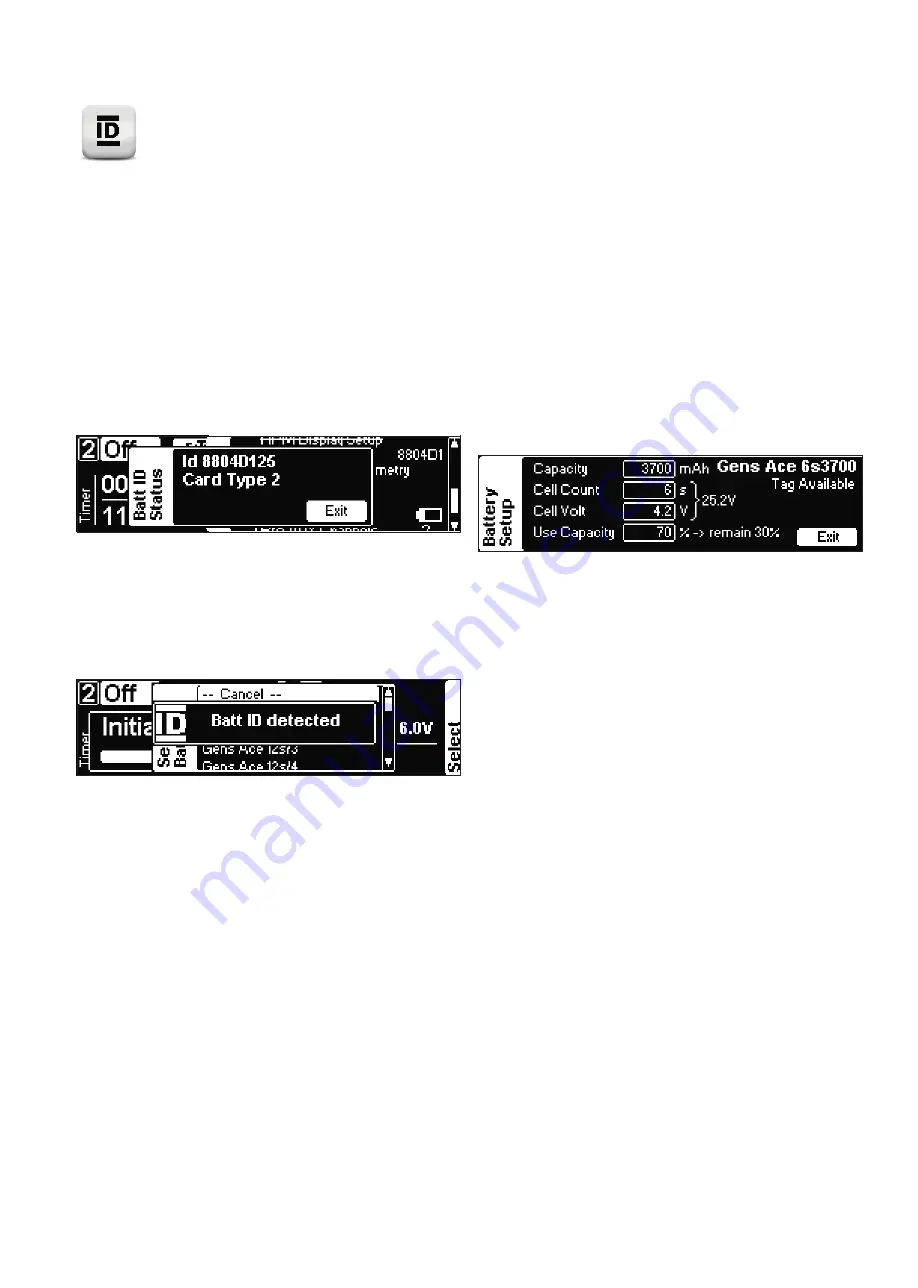
Battery ID App
Note Get this App by connecting your VBar Control
to a computer and accessing the App Store using
VBar Control Mana ger.
This App enables support for Battery ID detection. It needs
a Battery ID Reader and a Voltage/Current-Sensor for
VBar Control connected to the VBar, and a Battery ID Tag
attached to each flight pack.
With the Battery ID Reader installed in your Model and this
App downloaded and activated in VBar Control, you will
find a new Menu item
Batt ID
below
Application Settings
. The
panel behind this entry can be used to check for proper
detection and range of an ID Tag. It displays the unique
number of the ID Tag.
Card Type is always ‘Type 2’ with original ID Tags from
Mikado.
Once the Battery ID Reader and this App are installed, an
already configured battery will be automatically detected
when it is installed into the model. The list from the
Battery
Logbook
will come up for a short time and will be closed
again automatically, with the corresponding battery select-
ed for use.
If you insert a battery that has not yet been configured in
VBar Control, the dialog
Battery Config
will come up auto-
matically. Exiting this dialog will save the battery’s settings
for battery detection in the future.
If you want to change the settings for a specific battery
later on, just install it in your model and select the
Battery
Config
dialog from the
Battery Logbook
again.
☝
Attention The selected battery from the Battery Logbook
will remain active until it is disconnected again.
☝
Attention To read a new Battery ID Tag, the motor switch
must be in ‘Motor OFF’ position. We recommend to pow-
er-cycle your model when you replace the flight battery,
especially when using a receiver battery/external BEC/buf-
fer battery or similar, to recalibrate all sensors.
If you want to assign a Battery ID Tag to an already config-
ured battery, follow these steps:
■
Stick a new Battery ID Tag to the battery.
■
Connect the battery to your model, but keep it out of
range from the Battery ID Reader (e.g. outside the bat-
tery bay).
■
Select the battery from the list from
Battery Logbook
manually.
■
Only now put the battery into the model, so the Battery
ID Tag can be detected.
■
Now bring up the
Battery Config
dialog from
Battery Log-
book
. In the upper right corner, you will see that an ID
Tag is available.
■
After you quit this dialog using
Exit
, the Battery ID Tag
will be assigned to the battery automatically.
■
Use the same procedure to assign a new Battery ID Tag
to an already tagged battery.
Hints on using batteries on different helis
If you intend to use e.g. 6s packs on one model, and two
identical packs on a different model as 12s packs, follow
these steps:
■
Mark your 6s batteries accordingly, e.g. A1, A2 (= 12s
pack A) and B1, B2 (= 12s pack B) and so forth.
■
Tag your 6s packs A1, A2, B1, B2 etc. with one ID Tag
each, in a position where it will be read on the
small
model. This way, the
small
packs are already uniquely
identifiable and can be configured in VBar Control indi-
vidually.
■
Now tag one pack from A and an other pack from B etc.
with a second ID Tag, on one of the remaining surfaces.
■
If you want to fly 12s, install this
ID battery
which identi-
fies the double A or the double B flight pack into your
model, in a way that the second tag and not the 6s tag
can be read. This way, the
big
packs are identifiable us-
ing the second Tag, and can be configured as 12s packs
in VBar Control.
■
Try and wear your batteries equally with regard to duty
cycles and power draw/consumption, so they will work
properly when used as 12s packs, having approximately
the same age and wear.
Mikado Model Helicopters GmbH
Friedrich-Klausing-Str. 2 · 14469 Potsdam · Germany
T49 (0) 331 23749-0 · T49 (0) 331 23749-11
[email protected] · www.mikado-heli.de · v1.01 11-2014
Order No. 04907




